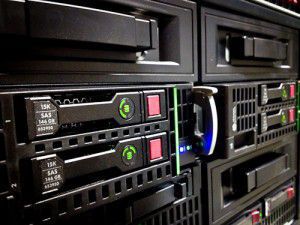Post Update: As per Preetam´s comment, HP has published a customer advisory regarding the usage of install vs update.

After installing a couple of brand new HP ProLiant BL460c G8 blades with HP Smart Array P220i controllers at a customer site, I decided that I should upgrade from the VMware-ESXi-5.0.0-Update1-623860-HP-5.20.43.iso Build 623860 used to install the blades, to the latest 821926 build offered by VMware.
Normally this is a really easy process using VMware Update Manager, but since this is a new installation all the prerequisites for that are not in place just yet and I decided to use esxcli to perform the update.
After placing the downloaded ESXi500-201209001.zip VIB file on the local datastore on the first host, I ran the update with the following command: (abbreviated for legibility)
[cc lang=“bash” width=“95%” theme=“blackboard” nowrap=“0”] ~ # esxcli software vib install -d /vmfs/volumes/datastore1/ESXi500-201209001.zip Installation Result Message: The update completed successfully, but the system needs to be rebooted for the changes to be effective. Reboot Required: true VIBs Installed: […] VIBs Removed: […] ~ # [/cc]
So far so good! One quick, as quick as a HP blade can, reboot later my host was updated to ESXi 5.0.0 Build 821926 and everything looked fine. That is, until I wanted to put some new files into the blades local storage. Much to my surprise, there was no local storage to be seen at all. Thinking that something must have gone wrong while booting, I decided to try a new restart and imagine my surprise when the blade booted up again, but this time with Build 623860.
Thinking that I must have messed things up pretty badly, I decided to try the same procedure on the second HP ProLiant BL460c G8 blade installed in the same manner. And yet again, I got the same results.
While this is somewhat comforting when contemplating Albert Einstein´s definition of insanity, it´s not comforting when it comes to the procedure I followed for updating the hosts.
This time around I recorded the output the esxcli command gave me, and found this little gem hidden inside the output:(unrelated VIBs removed)
[cc lang=“bash” width=“95%” theme=“blackboard” nowrap=“0”] ~ # esxcli software vib install -d /vmfs/volumes/esx5local/ESXi500-201209001.zip Installation Result Message: The update completed successfully, but the system needs to be rebooted for the changes to be effective. Reboot Required: true VIBs Installed: […], VMware_bootbank_scsi-hpsa_5.0.0-17vmw.500.0.0.469512, […] VIBs Removed: […], Hewlett-Packard_bootbank_scsi-hpsa_5.0.0-28OEM.500.0.0.472560, […] ~ # [/cc]
So, in short the update from VMware removes the HP Bootbank VIB for local SCSI controllers, and replaces it with a VMware one. Effectively this removes the ESXi hosts ability to read the local datastore from the HP Smart Array P220i Controller.
What still baffles me though, is that the first boot after applying the update boots Build 821926, but subsequent boots are on Build 623860…
In the end, to rectify the issue, I found the scsi-hpsa-5.0.0-28OEM.500.0.0.472560.x86_64.vib file on hp.com, downloaded it and placed it on the host.
I then ran the update again [cc lang=“bash” width=“95%” theme=“blackboard” nowrap=“0”] ~ # esxcli software vib install -d /vmfs/volumes/datastore1/ESXi500-201209001.zip Installation Result Message: The update completed successfully, but the system needs to be rebooted for the changes to be effective. Reboot Required: true VIBs Installed: […] ~ # [/cc]
After installing the update, I then installed the HP ProLiant Smart Array Controller Driver
~ # esxcli software vib install -v file:/tmp/scsi-hpsa-5.0.0-28OEM.500.0.0.472560.x86_64.vib
Installation Result
Message: The update completed successfully, but the system needs to be rebooted for the changes to be effective.
Reboot Required: true
VIBs Installed: Hewlett-Packard_bootbank_scsi-hpsa_5.0.0-28OEM.500.0.0.472560
VIBs Removed: VMware_bootbank_scsi-hpsa_5.0.0-17vmw.500.0.0.469512
VIBs Skipped:
~ #This reverses the removal of the Hewlett-Packard_bootbank_scsi-hpsa_5.0.0-28OEM.500.0.0.472560 VIB by the VMware Update itself.
Another (quick) reboot, and finally my host was upgraded to the correct build and the local datastore was available too.
~ # cat /proc/driver/hpsa/hpsa0
hpsa0: HP Smart Array P220i Controller
Board ID: 0x3355103c
Firmware Version: 3.04
Driver Version: HP HPSA Driver (v 5.0.0-28OEM)
Driver Build: 2
IRQ: 217
Logical drives: 1
Current Q depth: 0
Current # commands on controller: 0
Max Q depth since init: 0
Max # commands on controller since init: 4
Max SG entries since init: 129
Max Commands supported: 1020
SCSI host number: 0
hpsa0/C0:B0:T0:L1 Direct-Access LOGICAL VOLUME 3.04 RAID 1(1+0)
~ #Thankfully these blades had not yet been put into production, and I was free to wrestle with them as much as I wanted to make this work, without it affecting anything other than my troubleshooting genes.
I have not tested if the same scenario unfolds if the hosts are updated via VMware Update Manager, but I suspect that the results would have been the same.
Of course, the hosts could have been installed with the newer HP ESXi 5.0 U1 Sept 2012 refresh in the first place, and I probably would not have run into this issue, at least not until someone decided to apply a later patch to the host.
All in all, I guess the lesson here is that you need to be careful when updating your hosts and make sure you have a real retreat option ready if you need to quickly roll back to the previous build. The luxury of having the time and possibility to really troubleshoot the issue, might not be available to you if you are upgrading production systems.
Test your updates, every time.
Related Posts
- VMware vSphere Health Check - What´s in it for You? — Published
- VMware ESXi 4 vs ESXi 5 Log File Locations — Published
- vSphere 5: Creating a Hardware Version 4 VM — Published
- VMware by Broadcom Promises Free Security Updates for vSphere — Published
- VMware vSAN 8 U2 Announced at Explore 2023 — Published
